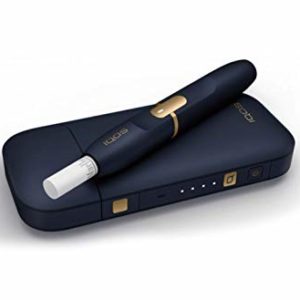The Food and Drug Administration (FDA) has issued a modified risk tobacco product (MRTP) marketing order for the IQOS tobacco heating system, a major step toward Philip Morris International’s stated goal of achieving a “smoke-free world.”
FDA Center for Tobacco Products Director Mitch Zeller said that IQOS, developed by Philip Morris International (PMI) as their next-generation flagship product, has been approved for an exposure modification marketing order. As a result, PMI can market the product in America as a replacement to what the industry calls “traditional combustible tobacco products,” but most people know as “cigarettes.”
“Through the modified risk tobacco product application process, the FDA aims to ensure that information directed at consumers about reduced risk or reduced exposure from using a tobacco product is supported by scientific evidence and understandable,” said Zeller, a regulatory lawyer by trade, in a statement. IQOS is the first and only electronic nicotine delivery system to receive an MRTP approval from the FDA.
PMI’s CEO André Calantzopoulos said that IQOS is “a fundamentally different product than combustible cigarettes and must be regulated differently, as the FDA has recognized.” According to PMI and the FDA, marketers for IQOS can now claim that the system has certain modified characteristics that other smoke-free products can’t.
Altria, the parent of Philip Morris USA, which holds the license to market IQOS in the U.S., also supports marketing its MRTP characteristics. Billy Gifford, the CEO of Altria Group, said that the risk-reduced approval is “an opportunity to communicate additional benefits of switching to IQOS and this decision is an important step for adult smokers.”
Among the FDA findings: The IQOS system heats tobacco but does not burn it; this product significantly reduces the production of harmful and potentially harmful chemicals; that scientific studies have shown that switching completely from regular cigarettes to the IQOS system reduces a human body’s exposure to harmful substances; along with similar research grounding.
“Data submitted by the company shows that marketing these particular products with the authorized information could help addicted adult smokers transition away from combusted cigarettes and reduce their exposure to harmful chemicals, but only if they completely switch,” Zeller said.
Iowa Attorney General Tom Miller (D), a long-time advocate for vaping and tobacco harm reduction in the public policy arena, told InsideSources that he is pleased with the decision.
“I’m pleased that the FDA approved the exposure modification statement,” Miller said. “That has the potential of saving many lives because heat-not-burn products are considerably less harmful than cigarettes. I wished they would have approved the risk modification order, however. It shouldn’t be too hard to conclude that the product without the smoke and toxic chemicals is less harmful.”
According to the FDA, IQOS cannot be marketed as a product that produces less risk than smoking cigarettes.
However, the MRTP approval is still a decision that gives tobacco consumers the opportunity to use products authorized by the FDA other than cigarettes and other alternatives like e-cigarettes, which are currently in regulatory uncertainty.
The FDA stressed the decision does not mean IQOS products are safe, rather smokers can reduce their exposure to harmful chemicals, but only if they completely switch.
Many studies show that IQOS can be less harmful compared to smoking cigarettes.
The heating mechanism modulates the temperature of the emitted aerosol, which is vapor from specialized heat sticks produced under specific conditions. Heating — rather than burning — tobacco drastically reduces the dangerous chemicals and potential carcinogens from the process.
Gregory Conley, president of the American Vaping Association, believes that the FDA’s announcement is good news.
“Allowing accurate labeling and advertising is one step toward fixing these misconceptions and fostering a regulatory system that encourages smokers to make smarter choices about their health,” Conley said, speaking from a policy point-of-view.
Lindsey Stroud, a board member of the Smoke-Free Alternatives Trade Association, also said that the FDA made “a crucial move to acknowledge reduced exposure of a newfangled tobacco product is a fantastic move for tobacco harm reduction efforts.”

